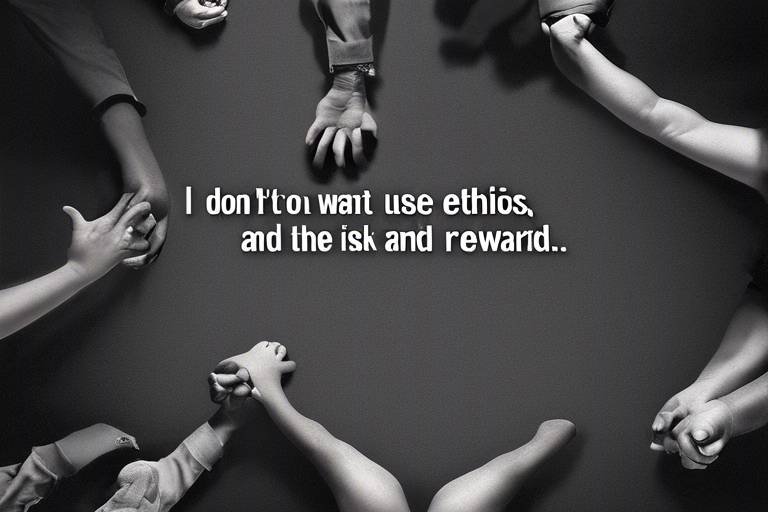Understanding the Ethics of Infidelity
Infidelity is a word that can send shivers down anyone's spine. It conjures images of betrayal, heartbreak, and shattered trust. But what does it really mean to be unfaithful? Is infidelity merely a physical act, or does it encompass a broader spectrum of emotional connections? In this article, we will navigate the complex moral landscape surrounding infidelity, examining the psychological, social, and ethical implications of cheating in relationships. We'll delve into the intricate web of trust, betrayal, and the possibility of forgiveness, all while exploring the motivations that drive individuals to stray from their commitments.
Infidelity can take many forms, and understanding these forms is essential to grasping its ethical implications. At its core, infidelity is often categorized into two primary types: emotional affairs and physical betrayals. An emotional affair involves forming a deep emotional connection with someone outside of the primary relationship, often leading to feelings of intimacy and closeness that should ideally be reserved for a partner. On the other hand, physical betrayal typically involves sexual relations with another person. These two types can overlap, creating a complicated scenario where both emotional and physical boundaries are crossed.
Moreover, infidelity can manifest in various degrees, ranging from a one-time fling to ongoing relationships that may last for years. Each scenario carries its own weight in terms of ethical considerations and consequences. The motivations behind these actions can vary widely, including a desire for novelty, unmet emotional needs, or even personal insecurities. By understanding the different forms of infidelity, we can better appreciate the profound impact it has on individuals and relationships.
Infidelity is not just a betrayal of trust; it can also wreak havoc on the psychological well-being of both partners involved. For the individual who cheats, feelings of guilt and shame can be overwhelming. They may find themselves grappling with the realization that their actions have caused deep emotional pain to someone they once loved. This internal conflict can lead to a cycle of self-doubt and anxiety, as they question their own moral compass and the decisions that led them to stray.
The impact on the betrayed partner can be even more profound. When trust is shattered, it often leaves behind a trail of emotional destruction. The feelings of hurt, betrayal, and loss of self-esteem can be paralyzing. Many individuals may experience a sense of disbelief, struggling to reconcile the reality of their partner's actions with the love they once felt. This emotional turmoil can manifest in various ways, including anger, sadness, and even a sense of isolation from friends and family.
Rebuilding trust after infidelity is a challenging yet possible endeavor. It requires open communication and a commitment to transparency from both partners. Strategies such as attending couples therapy, setting clear boundaries, and engaging in honest discussions about feelings can help restore faith in the relationship. However, it’s important to remember that healing takes time, and both partners must be willing to work through the pain together.
Infidelity can significantly alter an individual's self-perception. Whether one has been cheated on or has been the cheater, the experience can lead to a reevaluation of self-worth and identity. The betrayed may question their desirability and ability to maintain a successful relationship, while the one who strayed may grapple with feelings of shame and regret. Over time, these experiences can shape how individuals view themselves and their future relationships.
Understanding why individuals cheat is crucial for ethical considerations. Motivations for infidelity can be complex and multifaceted. Some common reasons include:
- Unmet Needs: When emotional or physical needs are not being fulfilled, individuals may seek validation elsewhere.
- Desire for Novelty: The thrill of new experiences can be enticing, leading some to stray in search of excitement.
- Personal Insecurities: Feelings of inadequacy can drive individuals to seek affirmation through external relationships.
By examining these motivations, we can better understand the ethical implications of infidelity and the human experience behind it.
Different ethical frameworks provide various lenses through which to view infidelity. Understanding these perspectives can help us navigate the moral complexities surrounding cheating in relationships. For instance, a consequentialist view focuses on the outcomes of infidelity, considering whether the consequences justify the act itself. On the other hand, deontological ethics emphasizes the morality of actions, viewing fidelity as a moral duty that should not be broken.
From a consequentialist standpoint, the outcomes of infidelity are paramount. This perspective considers how the consequences of cheating can either justify or condemn the act itself. For example, if an affair leads to greater happiness for all parties involved, some may argue that it is ethically permissible. However, if the act results in significant emotional pain and turmoil, the ethical implications become more contentious.
In contrast, deontological ethics focuses on the morality of actions rather than their consequences. This perspective argues that fidelity is a moral duty, and breaking that commitment is inherently wrong, regardless of the outcomes. The implications of this view suggest that individuals should uphold their promises and commitments, even in the face of personal dissatisfaction or temptation.
Q: Can infidelity ever be justified?
A: While some may argue that certain circumstances could justify infidelity, the emotional damage it causes often outweighs any perceived justification.
Q: How can couples rebuild trust after infidelity?
A: Rebuilding trust requires open communication, transparency, and a commitment from both partners to work through the pain together.
Q: What are the psychological effects of infidelity?
A: Infidelity can lead to feelings of guilt, shame, and loss of self-esteem for both partners, significantly impacting their mental well-being.

The Nature of Infidelity
Infidelity is a multifaceted phenomenon that can take various forms, each with its own set of emotional and ethical implications. At its core, infidelity involves a breach of trust between partners, often leading to feelings of betrayal and heartache. But what exactly constitutes infidelity? It can range from emotional affairs, where one partner develops a deep emotional connection with someone outside the relationship, to physical betrayals, which involve sexual encounters. Understanding the different types of infidelity is crucial for grasping the broader ethical conversations surrounding it.
To further illustrate the complexity of infidelity, let’s break it down into the primary categories:
- Emotional Infidelity: This occurs when one partner forms a close emotional bond with someone else, sharing intimate thoughts and feelings that should ideally be reserved for their significant other. It can be just as damaging as physical infidelity, as it undermines the emotional foundation of the relationship.
- Physical Infidelity: This is the more traditional view of cheating, involving sexual acts with someone outside of the committed relationship. The physical act often carries a heavy emotional weight, leading to feelings of inadequacy and betrayal.
- Online Infidelity: In today’s digital age, infidelity can also manifest through online interactions. Engaging in flirtatious conversations, sharing intimate photos, or even participating in virtual relationships can all fall under this category.
Each type of infidelity raises important questions about the ethical responsibilities partners have toward one another. Are emotional affairs just as damaging as physical ones? Can online interactions be considered cheating? These questions often lead to heated debates among couples and in broader societal discussions.
Moreover, the motivations behind infidelity can vary significantly. Some individuals may seek emotional fulfillment that they feel is lacking in their primary relationship, while others might be driven by a desire for novelty or excitement. Personal insecurities can also play a role, as individuals may cheat to validate their self-worth or escape feelings of inadequacy. Understanding these motivations is essential for addressing the ethical implications of cheating and the potential for healing.
In summary, the nature of infidelity is complex and layered, encompassing a variety of forms and motivations. As we delve deeper into this topic, it becomes evident that the ethical considerations surrounding infidelity are as intricate as the relationships themselves. The impacts of infidelity ripple through the lives of those involved, challenging our notions of trust, commitment, and personal integrity.
Q: What is the most common type of infidelity?
A: Emotional infidelity is often cited as one of the most common forms, as it can occur without any physical interaction but still deeply affects the primary relationship.
Q: Can a relationship survive infidelity?
A: Yes, many relationships can survive infidelity, but it often requires open communication, counseling, and a commitment from both partners to rebuild trust.
Q: How can one prevent infidelity?
A: Maintaining open lines of communication, addressing unmet needs, and fostering emotional intimacy can help prevent infidelity in relationships.

Psychological Impacts on Individuals
Infidelity is not just a breach of trust; it’s a psychological earthquake that shakes the very foundations of those involved. The ramifications of cheating extend far beyond the momentary thrill or escape that a person might feel. For the betrayed partner, the emotional fallout can be devastating. Feelings of hurt, betrayal, and a profound loss of self-esteem often accompany the revelation of infidelity. It's as if a dark cloud descends, casting shadows over their self-worth and future relationships.
But let’s not forget about the one who strays. The cheater often grapples with their own demons. They may experience intense feelings of guilt and shame, struggling with the moral implications of their actions. This internal conflict can lead to a vicious cycle of behavior where they seek emotional fulfillment outside their primary relationship, only to feel worse afterward. It’s like trying to fill a void with sand; no matter how much you pour in, it never feels complete.
To understand the full spectrum of psychological impacts, we can break it down into two main categories: the emotional consequences for the betrayed, and the long-term effects on self-identity for both parties.
The emotional toll on the betrayed partner can be profound and multifaceted. Initially, they might experience a rush of emotions, including shock, disbelief, and anger. This emotional rollercoaster can lead to a state of chronic anxiety, where the individual constantly questions their worth and the validity of their relationship. It’s not just about losing a partner; it’s about losing a part of themselves.
Common emotional responses include:
- Loss of Trust: Trust is the bedrock of any relationship. Once broken, it can take years to rebuild, if it can be rebuilt at all.
- Feelings of Inadequacy: The betrayed partner may begin to question if they were not enough, leading to a significant drop in self-esteem.
- Isolation: Many feel embarrassed or ashamed and may withdraw from friends and family, compounding their emotional pain.
Rebuilding trust after infidelity is challenging yet possible. It requires open communication and a commitment from both partners to address the underlying issues that led to the betrayal. The process can feel like climbing a steep mountain, where each step forward is hard-earned and fraught with setbacks. However, with patience and effort, it’s possible to reach the summit of renewed trust and understanding.
Infidelity can alter an individual's self-perception in profound ways. For the betrayed, there can be a lingering sense of doubt about their ability to love and be loved. This can lead to difficulties in future relationships, where the scars of past betrayals can influence their behavior and emotional availability. Conversely, those who cheat may also face identity crises, questioning their values and the choices they've made. It’s like wearing a mask; they may appear fine on the outside, but inside, they are grappling with the consequences of their actions.
Ultimately, the psychological impacts of infidelity are far-reaching and complex, affecting not just the individuals involved but also their families and social circles. Understanding these dynamics is crucial for fostering healing and moving forward.
Q: Can infidelity ever be justified?
A: While some may argue that certain circumstances can lead to infidelity, most ethical frameworks suggest that open communication and addressing unmet needs should be prioritized over cheating.
Q: How can couples rebuild their relationship after infidelity?
A: Rebuilding a relationship requires sincere communication, therapy, and a commitment to understanding the root causes of the infidelity. It's a long process, but many couples find success through dedicated effort.
Q: What are the signs of emotional infidelity?
A: Emotional infidelity can manifest as a partner becoming increasingly secretive, spending more time on their phone, or showing signs of emotional distance. If you notice these signs, it’s essential to communicate openly with your partner.

Emotional Consequences for the Betrayed
When infidelity strikes, the emotional fallout can be devastating for the betrayed partner. It's as if a bomb has exploded in what was once a safe and secure relationship, leaving behind a landscape of confusion, hurt, and shattered trust. The initial shock often gives way to a whirlwind of feelings that can be overwhelming. Many individuals report experiencing a profound sense of betrayal and loss that can feel insurmountable. It's not just the act of cheating that hurts; it's the implications of that act—what it says about the relationship and the person they thought they knew.
Feelings of hurt often manifest as an emotional rollercoaster. One moment, the betrayed partner may feel intense anger towards their partner, while the next, they might spiral into deep sadness or self-doubt. This emotional turmoil can lead to a significant loss of self-esteem, as individuals often question their worth and attractiveness. They may wonder, "What did I do wrong?" or "Why wasn't I enough?" These questions can haunt them, creating a toxic cycle of self-blame and despair.
Moreover, the psychological impacts can lead to anxiety and depression. Many betrayed partners find themselves plagued by intrusive thoughts about their partner's infidelity, replaying scenarios in their minds, and imagining what their partner did during the affair. This can make it incredibly difficult to move forward, as trust—once broken—becomes a fragile concept. The emotional scars left by infidelity can take years to heal, and some individuals may find it hard to trust again, even in future relationships.
In addition to these emotional repercussions, the betrayed partner may also experience a sense of isolation. Friends and family may not fully understand the complexities of the situation, leading to feelings of loneliness. It's common for individuals to withdraw from social circles, fearing judgment or pity. This isolation can exacerbate feelings of sadness and despair, creating a vicious cycle that is hard to break.
To illustrate the emotional consequences of infidelity, consider the following table that outlines common feelings experienced by those who have been betrayed:
| Emotion | Description |
|---|---|
| Hurt | A deep sense of pain caused by betrayal. |
| Anger | Frustration and rage towards the partner who cheated. |
| Sadness | Feelings of loss and mourning for the relationship. |
| Confusion | Struggling to understand why the infidelity occurred. |
| Shame | Feeling embarrassed or inadequate because of the betrayal. |
| Isolation | A sense of being alone in the experience. |
Ultimately, the emotional consequences of infidelity for the betrayed partner are profound and multifaceted. Healing from such a betrayal is no small feat; it requires time, self-reflection, and often professional support. As difficult as it may be, understanding these emotions can be the first step toward recovery. The journey may be long, but with the right tools and support, it is possible to reclaim one's sense of self and move forward.
- What are the first steps to take after discovering infidelity? It's essential to process your emotions and consider seeking support from trusted friends or a therapist.
- Can a relationship survive infidelity? Yes, many couples can rebuild trust and strengthen their relationship after infidelity, but it requires commitment from both partners.
- How long does it take to heal from infidelity? Healing is a personal journey and can take anywhere from months to years, depending on various factors, including the couple's willingness to work through the issues.
- Is it normal to feel angry after being cheated on? Absolutely. Anger is a natural response to betrayal and can be an important part of the healing process.

Rebuilding Trust
Rebuilding trust after infidelity is often likened to trying to piece together a shattered vase; it may never look the same, but with patience and care, it can still hold beauty and function. Trust is the foundation of any relationship, and when that foundation is cracked, the entire structure can feel unstable. So, how do couples navigate this treacherous terrain? The journey to restoring trust is not only challenging but also deeply personal, requiring both partners to engage in open dialogue, empathy, and commitment to change.
First and foremost, communication plays a crucial role in the healing process. Both partners must be willing to express their feelings honestly and openly. This means discussing the reasons behind the infidelity without becoming defensive or dismissive. The betrayed partner needs to voice their pain, while the one who strayed must acknowledge their actions and the hurt they caused. This exchange can be incredibly difficult, but it's essential for moving forward.
Another vital aspect is transparency. After a breach of trust, it’s important for the partner who cheated to be transparent about their actions and intentions. This might involve sharing details about their day-to-day activities, being open about their feelings, and even allowing access to phones or social media accounts, if that helps to rebuild trust. While this level of openness may feel invasive, it can serve as a reassurance to the betrayed partner, helping them to feel more secure.
Additionally, establishing boundaries is key. Couples should discuss and agree on what behaviors are acceptable moving forward. This could mean setting limits on interactions with certain friends or being more mindful about social situations that could lead to temptation. By setting clear expectations, both partners can work together to foster a safer emotional environment.
It's also important to recognize that rebuilding trust is a gradual process. It won’t happen overnight, and both partners must be patient with each other. There will be good days and bad days, and it’s essential to celebrate the small victories along the way. Couples might find it helpful to engage in activities that reinforce their bond, such as going on date nights or participating in shared hobbies. These positive experiences can help to create new, happy memories that overshadow the painful ones.
Lastly, it might be beneficial to seek the help of a professional therapist. A trained counselor can provide guidance and tools to help couples navigate their feelings and improve their communication skills. Therapy can create a safe space for both partners to express their emotions and work through their issues with the support of an unbiased third party.
In summary, rebuilding trust after infidelity is a multifaceted process that requires open communication, transparency, established boundaries, patience, and sometimes professional help. While the road may be rocky, couples who are committed to healing can emerge stronger and more connected than before.
- How long does it take to rebuild trust after infidelity? The timeline varies for each couple, depending on their willingness to communicate and work through their issues. It can take months or even years.
- Can trust ever be fully restored? While it may not return to its original state, many couples find that they can develop a new, deeper level of trust.
- Is therapy necessary for rebuilding trust? Therapy can be incredibly beneficial, but it’s not mandatory. It depends on the couple's dynamics and their ability to communicate effectively.

Long-Term Effects on Self-Identity
Infidelity doesn't just shake the foundations of a relationship; it can also create lasting ripples in an individual's self-identity. When someone experiences betrayal, either as the person cheated on or as the one who strayed, their perception of themselves can shift dramatically. Think about it: how often do we tie our self-worth to our relationships? When that bond is broken, it can feel like a part of us has been ripped away. The emotional aftermath often leads to a reevaluation of who we are and what we stand for.
For the betrayed partner, the journey of self-discovery can be fraught with challenges. Feelings of inadequacy and self-doubt can creep in, making them question their attractiveness, value, and ability to maintain a relationship. It's like standing in front of a funhouse mirror—everything seems distorted. They might find themselves asking, “Was I not enough?” This internal dialogue can lead to a significant decline in self-esteem and confidence.
On the flip side, the individual who cheated may also undergo a profound transformation. Initially, they might feel a rush of excitement or liberation, but this can quickly spiral into guilt and shame. The realization that they have betrayed someone they cared about can lead to a crisis of conscience. They might grapple with questions such as, “What does this say about me as a person?” This reflection can cause them to reassess their values and beliefs, potentially leading to a deeper understanding of their motivations and desires.
Interestingly, the long-term effects on self-identity can manifest in various ways. Here are a few potential outcomes:
- Increased Self-Awareness: Both partners may gain insight into their emotional needs and relationship patterns, leading to personal growth.
- Change in Relationship Dynamics: Individuals may become more cautious in future relationships, either by establishing clearer boundaries or by avoiding commitment altogether.
- Resilience and Strength: Overcoming the trauma of infidelity can foster a sense of resilience, empowering individuals to face future challenges with greater strength.
Ultimately, the path to healing and self-discovery is unique for everyone. Some may emerge from the experience with a renewed sense of self, while others might struggle for years to reclaim their identity. The key lies in understanding that infidelity, while painful, can also serve as a catalyst for growth. By confronting the emotional turmoil head-on and seeking support, individuals can begin to rebuild their self-esteem and redefine who they are beyond the betrayal.
- What are the common emotional responses to infidelity? Emotional responses can include feelings of betrayal, anger, sadness, and confusion. It's normal to experience a wide range of emotions.
- Can infidelity lead to personal growth? Yes, many individuals find that overcoming the challenges of infidelity can lead to increased self-awareness and personal development.
- Is it possible to rebuild self-identity after infidelity? Absolutely! With time, support, and self-reflection, individuals can rebuild their self-identity and emerge stronger than before.

Motivations Behind Infidelity
Understanding the motivations behind infidelity is essential in unraveling the complex tapestry of human relationships. People cheat for a myriad of reasons, and while some motivations may seem obvious, others can be deeply rooted in psychological and emotional needs. Often, infidelity is not just a simple act of betrayal but a symptom of underlying issues that individuals face within themselves or their relationships.
One of the most common reasons people stray is the feeling of unmet needs. This can encompass emotional, physical, or even sexual desires that are not being fulfilled in their primary relationship. Imagine being in a relationship where you feel like your partner is more of a roommate than a romantic partner. Over time, this lack of connection can lead to seeking affection and intimacy outside the relationship. The irony is that while individuals may seek solace in someone else's arms, they often find themselves grappling with guilt and shame afterward.
Another significant factor is the desire for novelty. Humans are inherently curious creatures, and the thrill of the chase can be intoxicating. For some, the excitement of a new relationship can overshadow the stability of their existing one. It’s akin to the allure of a new car—while your old vehicle still works perfectly fine, the shiny new model beckons with promises of adventure and excitement. This craving for new experiences can lead to impulsive decisions that have lasting repercussions.
Additionally, personal insecurities play a pivotal role in infidelity. Individuals who struggle with self-esteem may look for validation outside their primary relationship. They might seek attention from others to boost their confidence, believing that external validation can fill the void they feel within. This behavior, however, often leads to a vicious cycle where the individual feels even less secure after the act, perpetuating their need for further validation.
Interestingly, infidelity can also be a form of escape. For some, the pressures of daily life, work stress, or unresolved conflicts within the relationship can create a desire to find relief through an affair. This escape can provide temporary happiness, but it often complicates matters further, leading to a web of deceit that can be challenging to untangle.
In summary, the motivations behind infidelity are as diverse as the individuals who engage in it. Whether it's unmet needs, a desire for novelty, personal insecurities, or a quest for escape, understanding these motivations can shed light on the ethical implications of cheating. Recognizing these underlying factors is crucial for anyone looking to navigate the murky waters of relationships and infidelity.
- What are the most common reasons for infidelity? Many people cheat due to unmet emotional or physical needs, a desire for novelty, personal insecurities, or as a means of escaping stress.
- Can infidelity be forgiven? Yes, many couples can rebuild their relationship after infidelity, but it requires open communication, trust-building, and a willingness to address underlying issues.
- How does infidelity affect self-esteem? Infidelity can significantly impact self-esteem, both for the person who cheats and the one who is betrayed, leading to feelings of guilt, shame, and loss of self-worth.

Ethical Perspectives on Cheating
When we dive into the murky waters of infidelity, it’s essential to consider the various ethical frameworks that shape our understanding of cheating. Each perspective offers a unique lens through which we can analyze the implications of betrayal, and these frameworks can significantly influence how individuals and society at large perceive and respond to infidelity. Let’s explore the three primary ethical perspectives: consequentialism, deontological ethics, and virtue ethics.
Consequentialism is a moral philosophy that judges the rightness or wrongness of an action based on its outcomes. In the context of infidelity, a consequentialist might ask, “What are the results of cheating?” If the affair leads to greater happiness for the individuals involved, some may argue that it can be justified. However, this perspective can also highlight the negative repercussions—such as emotional pain, broken families, and shattered trust—that often accompany infidelity. Thus, a consequentialist analysis might conclude that the potential harm caused by cheating typically outweighs any fleeting pleasure gained from the act.
On the other hand, deontological ethics focuses on the morality of actions themselves, rather than their consequences. This perspective posits that fidelity is a moral duty, and breaking that commitment is inherently wrong, regardless of the outcome. From this viewpoint, cheating is seen as a violation of trust and respect between partners. It raises questions about the nature of promises and commitments in relationships. For those who adhere to deontological principles, the act of cheating is a betrayal of not only one’s partner but also of one’s own moral integrity.
Finally, we have virtue ethics, which emphasizes the character and virtues of the individuals involved rather than the specifics of the act itself. This perspective invites us to consider what kind of person cheats and what virtues they may lack—such as honesty, loyalty, and respect. Virtue ethicists might argue that engaging in infidelity reveals deeper issues within a person’s character, suggesting that a commitment to personal growth and ethical behavior is essential for healthy relationships. The focus here is on developing virtues that promote trust and fidelity, ultimately leading to more fulfilling connections.
To better illustrate these perspectives, let's take a look at the following table that summarizes the key differences:
| Ethical Perspective | Focus | Key Question |
|---|---|---|
| Consequentialism | Outcomes of actions | What are the results of cheating? |
| Deontological Ethics | Morality of actions | Is cheating inherently wrong? |
| Virtue Ethics | Character and virtues | What kind of person cheats? |
Understanding these ethical perspectives can help individuals reflect on their own values and the implications of their actions in relationships. It also opens the door for deeper conversations about trust, loyalty, and what it means to be committed to someone. After all, navigating the complexities of human relationships requires more than just a set of rules; it necessitates a profound understanding of our own ethical beliefs and the impact they have on those we care about.
As we explore the multifaceted nature of infidelity, it’s crucial to recognize that the ethical dimensions of cheating are not just black and white. They are woven into the fabric of human experience, filled with nuances and complexities that demand empathy and understanding. So, whether you're grappling with your own experiences or trying to support a friend through a tough time, consider these ethical perspectives as tools for navigating the stormy seas of infidelity.
- What is the most common reason for infidelity? Many individuals cheat due to unmet emotional needs or a desire for novelty.
- Can a relationship survive infidelity? Yes, with open communication and a commitment to rebuilding trust, many relationships can recover from infidelity.
- How can I rebuild trust after being cheated on? Rebuilding trust requires transparency, honesty, and a willingness to address the underlying issues that led to the betrayal.

Consequentialist Views
When we dive into the world of ethics, particularly through the lens of consequentialism, we find ourselves grappling with a fundamental question: what are the outcomes of infidelity? Consequentialism posits that the morality of an action is determined by its results rather than the action itself. In the context of infidelity, this perspective encourages us to weigh the repercussions of cheating on all parties involved.
Imagine a scenario where a person cheats, believing it will bring them happiness or fulfillment. From a consequentialist viewpoint, we must assess whether that fleeting moment of joy for the cheater is worth the profound pain inflicted on their partner. This leads us to consider several critical outcomes:
- Emotional Pain: The immediate emotional fallout for the betrayed partner can be devastating. Feelings of betrayal, anger, and sadness often dominate their experience.
- Impact on Relationships: Infidelity can ripple through social circles, affecting not only the couple but also friends and family who are entwined in their lives.
- Long-Term Trust Issues: The breach of trust can lead to lasting scars, making it difficult for the betrayed partner to trust again in future relationships.
- Personal Growth or Regression: For some, the experience of infidelity can lead to personal growth and a deeper understanding of their needs, while for others, it may result in regression and further emotional turmoil.
These outcomes highlight the complexity of infidelity from a consequentialist perspective. It forces us to ask whether the temporary satisfaction gained from cheating justifies the potential long-term damage caused. In many cases, the answer is a resounding no. The emotional turmoil and the potential for relationship breakdown often outweigh any momentary pleasure derived from the affair.
Moreover, the consequences of infidelity extend beyond the immediate parties involved. Consequentialism encourages us to consider the broader societal implications as well. For instance, if infidelity becomes a norm, it could lead to a general erosion of trust in relationships, making it increasingly difficult for individuals to form meaningful connections. This societal shift could have profound effects on community cohesion and individual well-being.
In summary, the consequentialist view of infidelity invites us to reflect deeply on the impact of our actions. It challenges us to consider not only our personal desires but also the potential fallout on those we care about and the wider community. By understanding the consequences of cheating, we can make more informed and ethically sound choices in our relationships.
- What is consequentialism? Consequentialism is an ethical theory that judges actions based on their outcomes or consequences.
- How does consequentialism apply to infidelity? It evaluates the effects of cheating on all parties involved, considering whether the benefits outweigh the harms.
- Can infidelity ever be justified from a consequentialist perspective? In rare cases, if the outcome leads to greater overall happiness or fulfillment for all involved, some may argue it could be justified, though this is highly debated.
- What are the long-term effects of infidelity? Long-term effects can include trust issues, emotional scars, and potential changes in how individuals view relationships.

Deontological Ethics
When we dive into the realm of , we find ourselves grappling with the fundamental question of duty and moral obligation. This ethical framework, championed by philosophers like Immanuel Kant, emphasizes that certain actions are inherently right or wrong, regardless of their consequences. In the context of infidelity, deontological ethics posits that being faithful in a relationship is not merely a suggestion but a moral duty that individuals owe to their partners. This perspective challenges us to consider the weight of promises made and the ethical implications of breaking them.
At its core, deontological ethics argues that fidelity is a binding commitment. When two individuals enter into a relationship, they often do so with an implicit understanding of exclusivity and loyalty. This understanding creates a moral contract that, when violated, can lead to significant ethical ramifications. For instance, when one partner cheats, they not only betray their partner's trust but also undermine the very foundation of the relationship that was built on mutual respect and commitment. This breach of trust can be likened to breaking a sacred vow, where the act of infidelity becomes a moral failing rather than just a personal choice.
Furthermore, deontological ethics encourages us to reflect on the concept of autonomy. Each partner in a relationship has the right to make informed choices based on the terms of their commitment. Cheating, therefore, can be seen as a violation of this autonomy, as it disregards the partner’s right to know and consent to the dynamics of their relationship. This ethical lens invites us to consider the impact of our actions on others, fostering a deeper understanding of personal responsibility.
To illustrate this point further, consider the following table that summarizes key aspects of deontological ethics in relation to infidelity:
| Aspect | Description |
|---|---|
| Moral Duty | The obligation to remain faithful to one’s partner. |
| Promises and Contracts | The implicit agreement made between partners to uphold fidelity. |
| Autonomy | The right of each partner to make informed choices within the relationship. |
| Consequences | The ethical implications of breaking trust, regardless of the outcomes. |
In conclusion, viewing infidelity through a deontological lens compels us to confront the serious moral obligations we hold in our relationships. It emphasizes that fidelity is not just about avoiding negative consequences but about honoring the commitments we make to those we love. This perspective invites us to engage in self-reflection and consider how our actions align with our ethical beliefs, ultimately fostering healthier and more trustworthy relationships.
- What is deontological ethics? Deontological ethics is a moral philosophy that emphasizes the importance of duty and adherence to rules over the consequences of actions.
- How does deontological ethics apply to infidelity? It views fidelity as a moral obligation, suggesting that breaking this commitment is inherently wrong, regardless of the outcomes.
- Can infidelity ever be justified from a deontological perspective? Generally, no. Deontological ethics prioritizes the moral duty to remain faithful, making justification difficult.
- What are the consequences of infidelity in a deontological framework? The consequences are primarily ethical, involving the betrayal of trust and the violation of moral obligations.
Frequently Asked Questions
- What constitutes infidelity?
Infidelity can be defined in various ways, but it generally refers to a breach of trust in a committed relationship. This can include emotional affairs, physical cheating, or even online interactions that undermine the loyalty expected in a partnership.
- What are the psychological effects of being cheated on?
The emotional toll on the betrayed partner can be overwhelming. Feelings of hurt, betrayal, and a significant drop in self-esteem are common. Many individuals experience anxiety and depression as they grapple with the loss of trust and security in their relationship.
- Can trust be rebuilt after infidelity?
Yes, rebuilding trust after infidelity is challenging but possible. It requires open communication, transparency, and a commitment from both partners to work through the pain. Establishing new boundaries and demonstrating reliability over time can help restore faith in the relationship.
- What motivates people to cheat?
People cheat for various reasons, often related to unmet emotional or physical needs. Common motivations include a desire for novelty, feelings of inadequacy, or seeking emotional fulfillment that they feel is lacking in their current relationship.
- How do different ethical frameworks view infidelity?
Ethical perspectives on infidelity vary. Consequentialist views focus on the outcomes of cheating, questioning whether the consequences justify the act. In contrast, deontological ethics emphasize the inherent moral duty to remain faithful, regardless of the situation's outcome.
- What long-term effects can infidelity have on self-identity?
Infidelity can significantly alter an individual's self-perception. For the betrayed, feelings of inadequacy and loss of self-worth may linger, while the cheater might struggle with guilt and shame, impacting their self-identity and future relationships.
- Is it possible to forgive after infidelity?
Forgiveness after infidelity is possible but often requires time and effort. It involves processing emotions, understanding the motives behind the betrayal, and a mutual commitment to healing and growth within the relationship.



















